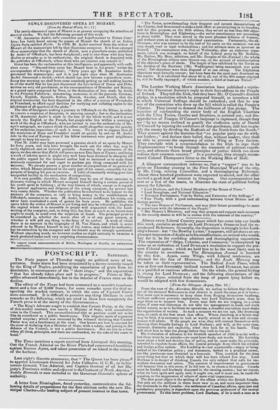NEWLY-DISCOVERED OPERA BY MOZART.
[From the Musical World, Di e.13] The newlyeliscovered opera of Mozart is at present occupying the attention of musical circles. We find the following account of thie work. "M. Anastasius Andre, aulic counsellor and kapell.meister to Prince Ester hazy, has lately found among the papers of Mozart the sketch of an Italian Opera Serie entitled Zlide. In 1799, N. Andrii received from the widow of Nunn all the manuscripts left by that illustrious composer. It is from amongst these manuscripts that the sketch of Zaitle, now a pianoforte score, published by Andre of Offenbach, has been deciphered ; and to ease those who may have doubts or scruples as to its authenticity, the original sketch is deposited with the publisher at Offenbach, where those who are anxious may consult it." Great has been the exclamation at this intelligence, and apparently with suffi• dent cause. " Six-and.forty years has Mozart been in his grave," writes the
correspondent of a foreign journal ; "forty years ago M. Anastasius Andre purchased his manuscripts; and it is just eight days since M. Anastasius .Andre discovered a sketch—which sketch has now become a pianoforte score.
Soule fine morning we shall have some somebody getting up and making known to all the world that he has just discovered the love-letters of Eneas and Dicke written on very old parchment, or the correspondence of Romulus and Remus, Or a grand opera composed by Nero, or the declaration of love made by Attila
to the Princess Puleheria: announcing, moreover, in all the journals, German, French, English, Spanish, Italian, Danish, Sweden, anti Dutch, that the original manuscript has been deposited in the office of a notary of Westphalia or Friezeland, to afford equal facilities for verifying and collating copies to the
inhabitants of all quarters of the globe."
The idea of foreigners making a journey to Offenbach on the Rhine, in order to remove a suspicion of deception, is amusing enough ; but as the declaration of M. Anastasius Andr6 is made in the face of the whole world, and it is not merely the English or the French, but people who live within a morning's walk of the shop at Offenbach, who are invited to test the authenticity of 111o. zart's autograph, we cannot think the editor could altogether escape the penalty of his audacious imposition—if such it were. We are not to suppose that all the musicians of Bonn and Frankfort would sit quietly by and see M. Amin; take in the rest of Europe, even if his fellow townsmen were good neighbours enough to keep his secret.
That M. AndrC may have possessed a genuine sketch of an opera by Mozart for forty years, and only have brought the work out the other (lay, may be easily exploited, and on rational grounds. Assuming the genuineness of the opera, we dare swear that Zelde will prove no new Don Juan or Figaro ; and being a work of inferior merit it might very well have been detained in obscurity till the public regard for the deceased author had so increased as to make them anxiously concerned for and eager to puchase any thing connected with his memory. We already possess a great number of compositions of no partieu'ar value, which Mozart produced in the early part of his career, ostensibly kr the purpose of keeping his pen in exercise. A habit of constantly writing gave him unequalled facility in the mechanism of composition. It is very possible, therefore, that Zuide may be one of those exercises in
dramatic writing in which Mozart occupied himself during a certain period of his youth spent at Salzburg ; of the true history of which, except as it regards the general application and diligence of the young composer, we possess but very scanty details. Whether the publication be calculated to (la honour to the memory of the composer, or only to bring money to the establishment at Offenbach, remains to be seen. M. Andri% however indifferent his vision, can never have overlooked a wotk of genius for forty years. He publishes the opera while the widow of Mozart is yet living and may be referred to ; he places the orginal where it is accessible to people well acquainted with the hand- writing of the composer, and, in doing this, has done as much as an honest man ought or could, to avoid even the suspicion of fraud. The principal point to be considered is, whether the music after all is of any great interest, or whether it will add any thing to the fame of its author. A work of which there is no mention in the biography of M. Von Nissen, and which is never referred to by Mozart himself in any of his letters, may indeed be authentic ; but its estimation by the composer and his friends may be strongly questioned. Without expecting much, we however confess no slight curiosity to examine a work produced under such very surprising circumstances.


























 Previous page
Previous page